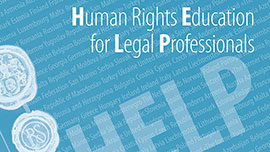Speech by Mr Philippe Boillat
Opening remarks by Philippe Boillat, Director General of Human Rights and Rule of Law, Council of Europe International Conference “Bringing human rights home: commitments, challenges, education and cooperation” on the occasion of the 20th anniversary of the accession of the Republic of Moldova to the Council of Europe
Chisinau, Republic of Moldova, 4-5 November 2015
Mr President of the Parliament,
Mr Minister,
Ms Director of the National Institute of Justice,
Your Excellencies,
Esteemed Judges and Prosecutors, Ladies and Gentlemen,
I am delighted to welcome you on behalf of the Council of Europe at today’s important Conference dedicated to the 20th anniversary of the accession of the Republic of Moldova to the Council of Europe. I would like to congratulate the authorities and the people of the Republic of Moldova for this important anniversary.
Implementation of the European Convention on Human Rights is our shared responsibility. This principle is at the core of the high-level discussions held in recent years by the Council of Europe to ensure the long-term efficiency of the system of human rights protection established by the Convention. The last such high-level meeting, the Brussels Conference, recalled the primary responsibility of the States Parties to ensure the effective implementation of the Convention at national level.
Against this background, it is right that the issue of the effective implementation of the Convention moves to the forefront of discussions in member States. Today’s Conference in Chisinau proves to be a clear demonstration of this trend.
The joint effort by executive, parliamentary and judicial authorities to better integrate the Convention standards into national law, policy and practice must be encouraged.
The effective execution of the European Court of Human Rights’ judgments is at the core of securing the effectiveness of the Convention system. Prevention, however, is another key word.
Once it is clear from a European Court’s judgment that there has been a violation of the Convention and that the underlying problem is not confined to the individual case, a State should already at that stage – and without waiting for subsequent judgments or a pilot one – look for general measures to be taken to prevent repetitive violations. In this regard, the harmonious co-operation between an executive and a parliament is required to ensure the execution of reforms, in particular when legislative power must be exercised to bring a legal framework into compliance with the Convention standards.
The role of domestic courts in ensuring the observance of human rights is a vital one. It was also reaffirmed at the Brussels Conference. The courts are the first guardians of human rights, ensuring the full, effective and direct application of the Convention – in light of the Strasbourg Court’s case law – in their national legal system, in accordance with the principle of subsidiarity. In this regard I refer to the highest national courts. They are best placed to lead the process of domestic application of the Convention through a harmonised national case law and to serve as an example to the lower courts. A number of applications to Strasbourg would not have been lodged if the principle of subsidiarity had been fully respected.
Ladies and Gentlemen,
It has to be recognised that the effective application of human rights at national level is a complex and challenging process. It requires coherent measures to be taken by all concerned.
Today’s Conference has brought us together to look at the achievements of the Republic of Moldova over the past 20 yearson its path towards bringing human rights home.
When joining the Council of Europe, Moldova accepted the statutory obligations and entered into a number of commitments as laid out in the Parliamentary Assembly of the Council of Europe’s Opinion No. 188 (1995). The fulfilment of those conditions serves as a prerequisite for strengthening democracy, the rule of law, and improving the protection of human rights and freedoms in the country.We acknowledge that over recent years, the Moldovan authorities have taken considerable steps towards ensuring the implementation of these core principles and values.
As an Organisation which stands on three pillars– standard setting, monitoring and co-operation –the Council of Europe closely follows the reform processes in its member States and contributes to their development. Within the mandate of the Directorate General of Human Rights and Rule of Law we have been co-operating with the Moldovan authorities on a number of issues. These primarily concern the areas of the constitutional reform, the reforms of the judiciary, law enforcement and anti-corruption bodies. Our co-operation actions aim to assist Moldova in the fulfilment of the remaining statutory and accession commitments towards the Organisation. We help the Moldovan authorities in the implementation of general measures in terms of the execution of the European Court’s judgments. And we target our support at bringing into life recommendations of the monitoring and political bodies of the Council of Europe.
In this context I will refer to some recent examples of our cooperation.
The measures that the Moldovan authorities have been taking over recent years, for instance with respect to the reform of the judicial system, fight against ill-treatment, enhancement of the national human rights and judicial training institutions, have already provided for major policy, legislative and institutional development. The Council of Europe regards them as positive signals towards ensuring the rule of law and the protection of human rights in the country.It is crucial that the Moldovan authorities continue to demonstrate the political will to further fulfil the remaining obligations and commitments in this direction. We expect the much needed reform of the public prosecution service of the Republic of Moldova to be accomplished in the near future.
The Council of Europe welcomes the effort made by the Moldovan authorities to improve the new Draft Law on the Public Prosecution Service of 2014following the last recommendations of the Venice Commission. The adoption of the revised Draft Law by the Parliament in the 1st reading is a further step towards establishing a modern, autonomous and efficient system of prosecution. Ultimately, the Council of Europe encourages the Moldovan authorities to finalise the reform of the Public Prosecution Service in line with the recommendations contained in the Joint Opinion of the Venice Commission, the Directorate of Human Rights and the OSCE/ODIHR of March 2015 and urges the Parliament to adopt the new Law without further delay.
I also would like to recall the need to re-consider certain provisions of the Moldovan Constitution, such as the ones regulating the election of the country’s President, in light of the constitutional crisis of 2011 and of the comments made by the Venice Commission in its related Amicus curiae, as well as those pertaining to the introduction of a new system for appointing a Prosecutor General.
The examples of co-operation I referred to concern primarily developments of the regulatory framework. However, a precondition for achieving the aims of the reforms is that all stakeholders are committed to fully performing the work that effective implementation of the reformed legislation requires.
This is why the support provided by the Council of Europe to the Moldovan authorities in its endeavors is not limited to legal expertise. We also support Moldova extensively in capacity development. In this regard, we target our support at improving institutional and operational capacities of justice sector stakeholders to implement the reforms. Equally, we contribute to enhancing skills and abilities of legal professionals to apply the human rights standards in their daily work.
The gradual advancement of the capacities of the National Institute of Justice of Moldova is a perfect demonstration of our sustainable cooperation with the Moldovan authorities.The Council of Europe is targeting, through multiple initiatives, the initial and continuous formal education of legal professionals, including through the incorporation of human rights in their mandatory curricula. To achieve this goal the importance of our cooperation with the Institute under the Council of Europe’s Programme for Human Rights Education for Legal Professionals – HELP – is to be mentioned. The HELP network is completely unique. It is the only genuine PAN-European Programme of legal education, bringing together national training institutions and bar associations from across 47 Council of Europe member States. It employs a tailor-made approach and integrates the Convention perspective into national law, so that human rights are not perceived as something alien.I am delighted that within the framework of this High-level Conference the HELP Programme will be officially launched in Moldova tomorrow.
Ladies and Gentlemen,
Let me thank our long-term partners and co-organisers of this event, the National Institute of Justice and the Ministry of Justice of the Republic of Moldova, for their initiative and collaboration in the organisation of this important Conference. I would like to take this opportunity and express my gratitude to all national stakeholders, non-governmental and international counterparts for their cooperation, synergies and firm commitment to our joint initiatives over the last years aimed at improving the human rights situation and strengthening the rule of law in the Republic of Moldova.
Last but not least, I wish to thank to the Danish Ministry of Foreign Affairs and the Human Rights Trust Fund for our long-track of successful cooperation in supporting democratic developments and human rights protection in Europe and specifically for their financial contribution to the Council of Europe Projects in this area, within the framework of two of which today’s Conference is being organised.
I am confident that all these partnerships will further develop and lead to fostering the process of bringing human rights home by the Republic of Moldova, even in a context recently marked by several vicissitudes of legal, economic and political nature.
Let me conclude by the words of our Secretary General, – “the Council of Europe’s raison d’être continues to be finding common solutions…
…to common problems…
…based on respect for human rights…
…and thus promoting greater unity in greater Europe.”
The full respect of our common values based on the Convention is a factor of internal stability in individual member States and beyond their borders. Provided that the effective implementation of the Convention is an ongoing challenge in ALL of our member States, let me reassure you that the Council of Europe is ready to continue supporting your country – our member State - in this endeavour.
* * *




